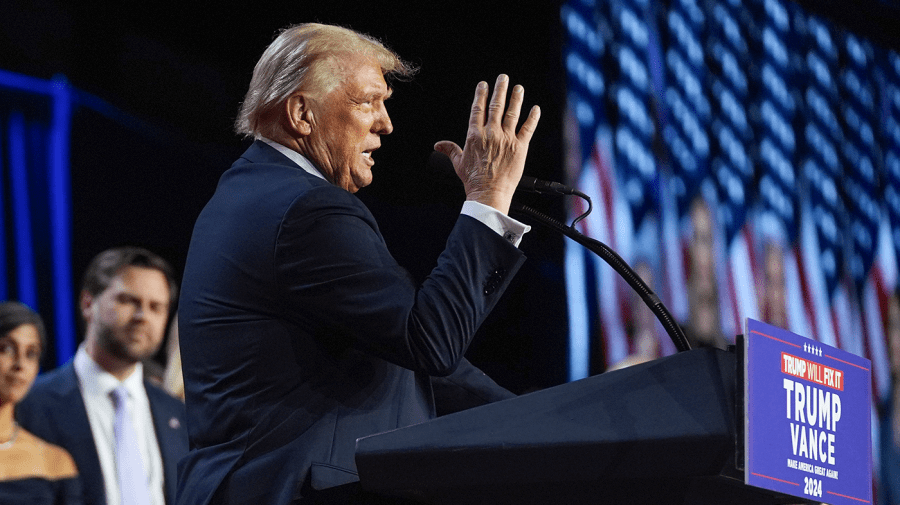
The President-elect Trump who will take the oath of office on Monday is a radically different figure than the one who shook up Washington eight years go.
This Trump knows more about how Washington works. Trump 1.0 wanted to change Washington, but Trump 2.0 is set up better to succeed, and the president-elect is equipped with a highly capable chief of staff in Susie Wiles, who has infused more discipline into his operation.
“When it comes to the three big things — the people, the process and the priorities — these guys are in a totally different league than we were in 2016,” said Sean Spicer, who served as Trump’s press secretary upon taking office in 2017.
“It’s not just lessons learned. It has to do with the environment,” Spicer added, noting that Trump this time has the full backing of the Republican Party and is entering with the mandate of a popular vote victory.
Trump’s team retains its outsider appeal, and the frenzy that was a defining element of Trump’s first term is unlikely to disappear. But it’s also a team with more insiders who can reach into the halls of American power. One of Trump’s top allies now is tech entrepreneur Elon Musk, the richest man in the world.
Other tech and business titans, including Jeff Bezos and Mark Zuckerberg, are signaling they want to work with Trump, underscoring how the next four years won’t be like the president-elect’s first four in office.
Two other important factors also make this Trump different.
Over the last four years, he survived the legal wringer, returning to power when many of his opponents thought a political comeback was an impossibility, given his courtroom challenges.
Separately, he enters the White House as a lame duck, knowing there will be no reelection effort in four years.
Those are key differences that could factor into decisions Trump makes, from going after political enemies to taking risks he won’t have to worry about on a 2028 campaign trail.
Trump was sworn into office in 2017 as a political newcomer and a brash outsider who had upended Washington norms. But he was also largely unfamiliar with how governing worked in Washington, and his first few weeks in office reflected that.
An executive order to ban individuals arriving from several majority-Muslim nations faced a disastrous rollout and a slew of legal challenges. His Cabinet picks were rolled out more slowly and some took several weeks to get confirmed. His White House staff frequently fought, and his first chief of staff lasted only seven months. And Republicans struggled to unify around a key campaign promise: to repeal and replace the Affordable Care Act.
This time around, Trump is the same unpredictable figure who has nominated outside-the-box Cabinet officials, including multiple former Fox News hosts. He has pushed unusual and potentially destabilizing ideas like annexing Canada and Greenland, taking control of the Panama Canal and mass deporting millions of immigrants without legal status.
He still has the ability to dominate a news cycle and take over the airwaves with a press conference, as he has done twice at Mar-a-Lago since winning November’s election.
But ahead of his second term, he has the benefit of an inner circle of advisers who worked in his first administration and on his 2024 campaign, including some who have already been active in laying the groundwork for his early days in office.
Stephen Miller, a senior adviser in Trump’s first White House, will serve as his deputy chief of staff and has already spoken with Republicans about his ambitious plans on immigration.
Tom Homan, a former director of Immigration and Customs Enforcement (ICE), has already been traveling to places like New York City, Chicago and the southern border in preparation for his role as Trump’s border czar.
Steve Witkoff, a close Trump ally who did not previously serve in government, was on the ground in Qatar as negotiators brokered a ceasefire agreement between Hamas and Israel that was announced Wednesday.
“I tell people, ‘Shock and awe was a ’17 concept,'” former White House chief strategist Steve Bannon said Tuesday at a Politico event. “Days of thunder I think are gonna be the concepts starting next Monday. And I think these days of thunder starting next week are going to be incredibly, incredibly intense.”
There is expected to be more cohesion among Trump’s staff in the White House, with Wiles seemingly finding a balance between letting Trump be Trump while keeping staff on the same page.
“She’s tough. She’s capable. She brings stability. She brings infrastructure. She’s respected by everybody inside and outside the White House,” said one source who has worked with Wiles.
Outside of the White House, Trump will also be on stronger footing than in 2017.
Where Trump in 2017 frequently clashed with Republican leaders such as then-Speaker Paul Ryan (Wis.), he enters office this time with an established relationship with Speaker Mike Johnson (R-La.). Trump has also met in recent weeks with Republicans in the Senate and House to ensure he has the full backing of the GOP upon taking office.
And he’ll have a cavalcade of outside supporters pushing his agenda, in the form of think tanks, conservative media influencers and powerful allies like Musk, who has already hinted that he could use his enormous wealth and megaphone to pressure Republicans who do not back Trump’s agenda.
Taken together, these factors amount to a second Trump term that will feature many of the same players but look drastically different in its ability to implement his agenda, especially in its early days.
“There’s no question the four years out of office have been extremely helpful,” Spicer said. “That will probably lead to the most successful four years of any modern presidency.”












